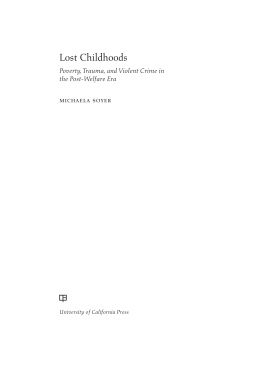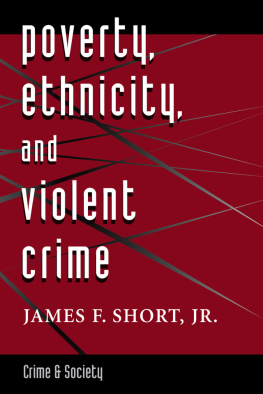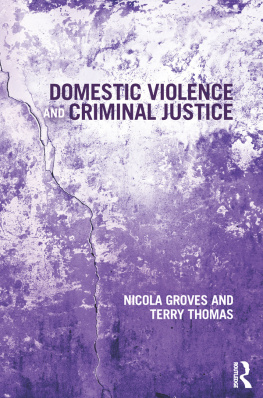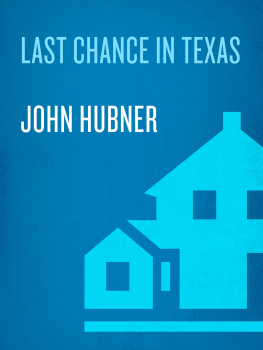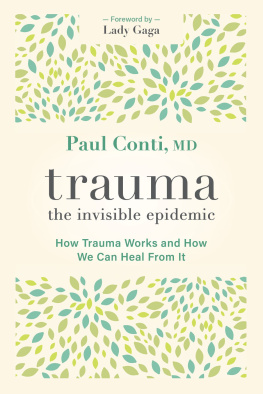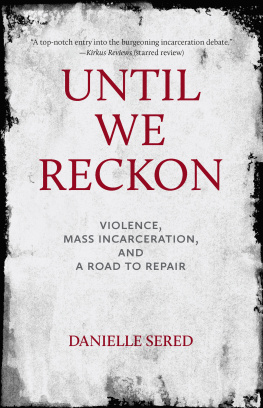University of California Press, one of the most distinguished university presses in the United States, enriches lives around the world by advancing scholarship in the humanities, social sciences, and natural sciences. Its activities are supported by the UC Press Foundation and by philanthropic contributions from individuals and institutions. For more information, visit www.ucpress.edu.
Cataloging-in-Publication Data is on file at the Library of Congress.
Acknowledgments
Most of all I am indebted to the young men I interviewed at SCI Pine Grove. They shared intimate and painful memories with me and vividly described their failures and feelings of shame and desperation. As they recalled their lives, they showed a remarkable level of self-reflection and clarity about their past. I hope that this book does justice to the complexity and dignity of their lives. I am equally grateful to the friends and caregivers who agreed to be interviewed. They graciously allowed me into their homes and helped me to expand my perspective on the young mens lives.
Lost Childhoods is my second book, but for the first time I had to work through data completely independentlywithout the thoughtful guidance of a dissertation committee. I continue to feel uncertain about the final product, but the many friends and colleagues who supported me throughout this research and writing process helped me to see this project through to its conclusion.
The research for this book was accomplished during my tenure as a postdoctoral scholar at the Justice Center for Research at Penn State University. I want to thank Gary Zajac and Doris McKenzie, who offered me a temporary intellectual home after I graduated from the University of Chicago. I am immensely grateful for the material and intellectual support the Justice Center for Research provided.
When I started my postdoctoral position, taking on a new project seemed daunting, but thanks to a grant from the ASA/NSF Fund for the Advancement of the Discipline, it became possible for me to conceptualize and conduct new research just after I had finished my dissertation. Of the many people who helped me during the data collection phase, I specifically would like to thank Shannon Singer, who diligently transcribed the interviews I conducted. My thanks also go to Steven Matthews. The meeting I had with him, before I began my interviews at SCI Pine Grove, inspired me to make use of maps and address history during the interview process. Over the course of this research, I often relied on the invaluable advice of my friend and fellow postdoctoral scholar Susan McNeely. Melinda Bell and Pamela McCratic have been the best adoptive aunts our daughters could wish for and I feel very lucky to have met them during this important time in my life.
As most researchers can attest to, it is very challenging to start a new research project when beginning a tenure track position. Lynn Chancer not only offered me my dream job, but also convinced the administration to let me defer my start date at Hunter College for another year. I am grateful for her advocacy and continuous support. At Hunter College I am lucky to be surrounded by fantastic colleagues, whose advice has been invaluable throughout my first years there. I want to thank my current department chair, Erica Chito-Childs, for understanding how difficult it is to balance motherhood, teaching, and research.
Of all friends and colleagues, Danielle Raudenbush has had the greatest impact on the intellectual development of this manuscript. She patiently read several versions of it and ensured that I remained committed to connecting my empirical observations with careful theoretical analysis. Without my parents presence, it would have been impossible to find the time necessary for finishing this book. They selflessly have taken care of our daughters during summer months and given me the space to do my work. My husband, Ed Silver, took over parenting duties while I conducted interviews. I am thankful for his patience and persistence through the emotional ups and downs of my writing process. I also want to thank my daughters, Cordelia and Rebekka, for reminding me what is really important in life.
My final thanks goes to Andrea Leverentz and Jerry Flores, whose extensive feedback improved the manuscript immeasurably.
Introduction
Only when a man can already perform an act of standing straight does he know what it is like to have a right posture and only then can he summon the idea required for proper execution.
JOHN DEWEY, Human Nature and Conduct , [1922] 1988
Isaacs grandmother remembers that her daughter was handcuffed to the bed when she picked up her newborn grandson from the hospital. When Isaac was born in March 1994 his mother was incarcerated. Two years later the State of Pennsylvania passed a law allowing the transfer of juveniles as young as fifteen to the adult criminal justice system. Act 33 ensures that teenagers who committed violent crimes (for example, robbery, aggravated indecent assault, or murder) can automatically be sentenced as if they were adults.
Isaac was a good kid, his grandmother recalls, quieter than the other four grandchildren she raised in a mid-sized town in eastern Pennsylvania. Now in her sixties she may never see her grandson again outside of prison walls. Isaac is serving a sentence of twenty to forty years for two counts of manslaughter. Since 2012 he is one of approximately three hundred inmates in a unit specifically designed for youths who are doing adult time for crimes they committed when they were younger than eighteen.
Isaac and the twenty-nine other youths I interviewed for this book had grown up long before they arrived at SCI Pine Grove, the remote prison in central Pennsylvania where I met them. Many saw their mothers or fathers succumbing to drugs or alcohol. They witnessed police raiding their homes and watched their fathers, uncles, and older brothers being whisked away to prison. As young children they faced eviction, gun violence, and hunger. They were born during the early to mid-1990s, a decade that saw an unprecedented expansion of the criminal justice system coupled with the disappearance of a robust welfare state.
Criminological theories offer many possible explanations for criminal behavior. Most, at least implicitly, acknowledge the role of rising inequality and concentrated disadvantage. Anomie theory argues that criminal behavior arises because conventional pathways to economic success are blocked (Merton 1938). Labeling theorists, in contrast, see deviance as a social construct serving those who are already in power (Erikson 1996). Recent work suggests disadvantaged areas offer more opportunities for criminal behavior. Poor neighborhoods lack resources, such as opportunities for legal employment and access to high-quality schools (Massey and Denton 1993; Wilson 2009; Graif, Gladfelter, and Matthews 2014). Growing up poor may also create a level of stress that leads to crime as a coping mechanism (Agnew 1992). Finally, developmental psychologists argue that cognitive deficits related to criminal behavior are more prevalent and less likely to be counteracted in socioeconomically disadvantaged situations than in middle-class families (Moffitt 1993).

